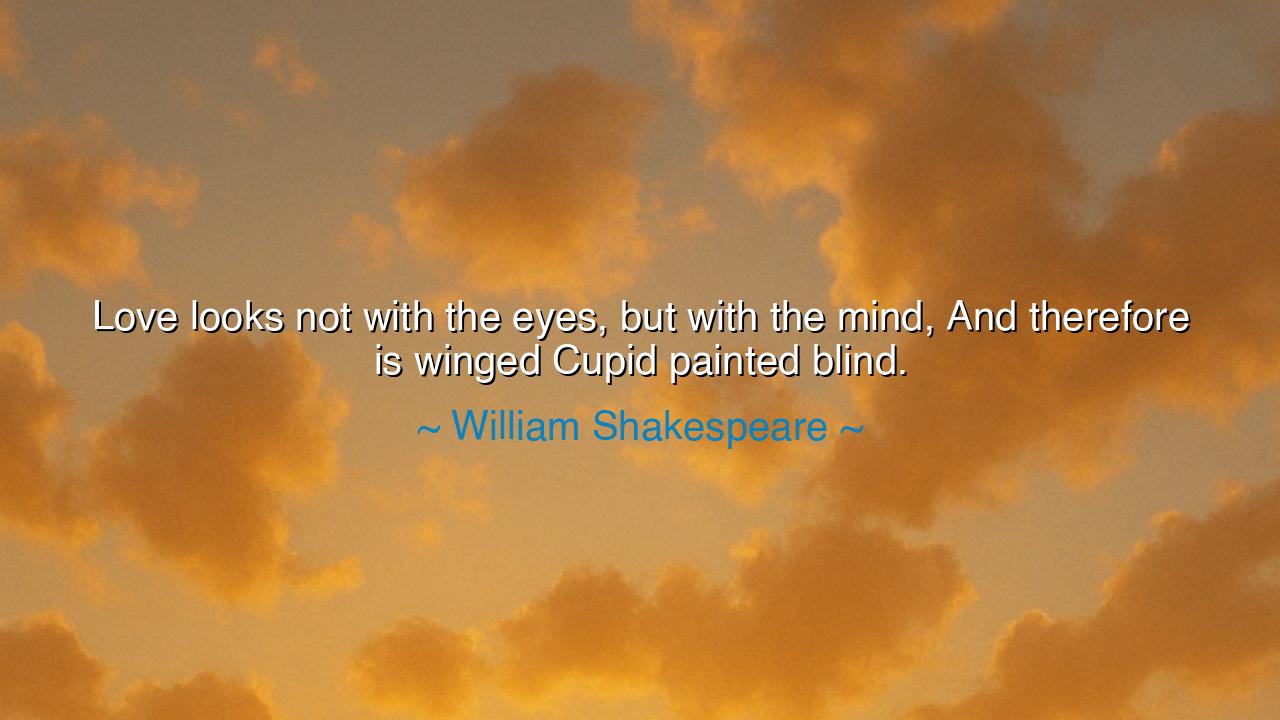
Love looks not with the eyes, but with the mind, And therefore is
Love looks not with the eyes, but with the mind, And therefore is winged Cupid painted blind.






“Love looks not with the eyes, but with the mind, And therefore is winged Cupid painted blind.” Thus wrote William Shakespeare, the master poet of the human soul, in his immortal play A Midsummer Night’s Dream. In this single line, spoken by the character Helena, Shakespeare unveils a truth that transcends time: that love, in its truest form, is not born of sight, but of spirit. It does not depend on beauty or form, nor on the illusions that the eyes behold, but on the deeper vision of the heart and mind. And because love sees with the inner sight of understanding and imagination, the god of love—Cupid—is painted blind, that he may strike where reason and judgment cannot reach.
To say that “love looks not with the eyes” is to say that love is not bound by appearances. The eyes are easily deceived; they measure, they compare, they crave what glitters. But the mind—and the soul that dwells within it—sees differently. It perceives essence rather than surface, truth rather than form. When one loves with the mind, one loves the unseen: the thoughts, the spirit, the laughter, the pain, the mystery of another being. Such love is not shallow desire, but recognition—an echo between two souls that know each other beyond the senses. Thus, Cupid’s blindness is not a flaw but a divine necessity, for true love transcends sight; it requires trust in what cannot be seen.
The origin of this line in A Midsummer Night’s Dream is steeped in the theme of illusion. In the play, love is portrayed as both magical and chaotic—men and women fall in love not because of reason, but because of enchantment. Shakespeare uses this confusion to reveal a higher truth: that love has never obeyed logic, nor followed the path of the eyes. Those who seek only with sight are enslaved to desire; those who see with the heart find eternity. In Helena’s lament, there is both pain and wisdom. She loves Demetrius, who does not love her back, and in her suffering she understands that love cannot be controlled by fairness or form—it is a mystery of the mind, not a judgment of the senses.
To understand this truth, consider the story of Beethoven, the great composer who, though deaf, created music that touched the heavens. In his later years, he fell deeply in love with a woman whose affection he could never fully claim. Yet his love for her inspired some of his greatest works—music that did not come from the ear, but from the mind and soul. Beethoven could not see or hear the beauty of love in its outward form, yet he felt it so deeply that it transcended the senses. His love, like Shakespeare’s vision, was blind to the physical but radiant with spiritual sight. It saw not what was, but what could be—the eternal within the temporal.
In these words, Shakespeare also warns of the foolishness and fragility of love. For when Cupid is blind, he does not choose wisely; he strikes without discrimination. Love, therefore, can unite the noble and the lowly, the beautiful and the plain, the wise and the foolish. Yet even in this blindness lies beauty—for it is in love’s unreason that humanity finds its greatest poetry, its most profound acts of sacrifice. Love that is logical is mere affection; love that is blind and selfless becomes transcendence. To love despite imperfection is to touch the divine, for only in imperfection can love prove its strength.
The lesson of this quote is both timeless and transformative: do not love only with your eyes, for what the eyes behold fades like sunlight on water. Instead, love with the mind, which sees through the veil of beauty and into the soul. Seek not the perfect face, but the kind heart; not the alluring voice, but the steadfast spirit. For the love that endures is not the one that begins with passion’s flame, but the one that is nourished by understanding, forgiveness, and shared purpose. Such love does not age—it deepens, becoming a sacred bond that outlasts the years.
So, my child of heart and longing, remember this wisdom: true love is blind not because it cannot see, but because it sees too deeply. It does not stop at the surface; it sees the eternal within the mortal, the divine spark within the fragile form. When you love, love not with calculation, but with courage. Close your eyes to the fleeting, and open your soul to the unseen. For when you love as Shakespeare teaches—with the mind, not the eyes—you will find that even in blindness, love has the clearest vision of all.






AAdministratorAdministrator
Welcome, honored guests. Please leave a comment, we will respond soon